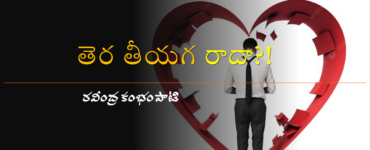Telugu: Chilukuri Devaputra
[This story stands in stark contrast to “Mother” by Maxim Gorky – where a mother takes away the life of her own child who was hell bent on destroying her motherland.
No matter what powers we attribute to God in giving life, or taking it away, it is indeed a woman, a mother, that bestows ‘life’ to all of us. For the very reason, she knows the value of life more than us, men, who are beset with perverted notions of patriotism and revenge to nip the innocent lives taking shape in the womb for no fault of theirs. For a mother, all mundane considerations, as above, come next to life. In fact, her association with life inalienable. Perhaps, this world, at the threshold of nuclear annihilation any moment, would have been a safer and livable place under women leadership.
Chilukuri Devaputra (4th April 1952- 18th October 2016), a renowned short story writer, brings out this contrast very succinctly in the present story. He was widely translated into English, Hindi, Marathi, Kannada, Odiya and won many prestigious awards.]
*
“One needs to be familiar with the names of the villages, of the people and their cultural practices in the border villages of India-Pakistan for this story…” Ananda Babu began.
“Story? What is that story about, sir?” Sivayya asked with curiosity.
“Vow! What a curiosity, Sivayya sir! I am going to tell you the story! But let me add this disclaimer: The names of villages and people are just fictitious and mentioned impulsively. If by any chance coincidence there exist people and places which are real, take it that the events narrated do not pertain to those people and places. The story I am going to narrate to you briefly is the one I have been spinning in my mind to put on paper.
“The title of the story?” asked Purushotham, another listener.
“The title of the story is …um… Inalienable!” he said.
*
Those were the last days of August 1947.
Rampur quietened as the night progressed. It must be about nine.
It was one of the border villages of Punjab.
The howling of the jackals was heard in the distance.
The sounds of cicada and cricket in the near were accentuating the silence.
Sleep evaded Hyma.
Her husband Arun Singh had left their home half an hour ago, saying he was attending some meeting and warned her to lock the door securely.
India was free by that time, but the people in the border villages suffered from insecurity.
Outside, it was drizzling intermittently.
Hyma had decided to stay awake till her husband returned.
Only a week before, Pakistanis carried away five women of a family killing all the male members. From that day onwards, youth from the village kept night watch by turns. They were holding a meeting that night planning, in revenge, to bring away women from Pakistan.
When Arun Singh disclosed this to his wife in the evening, she said, “Should you emulate the same heinous act those wicked people did? Then, what is the difference between you two?”
“To remove a thorn with another is our motto. When we bring their wives and sisters away from their homes, those cheats will come to know the pain,” said Arun Singh grinding his teeth.
“Say whatever you like, I don’t like that,” she replied ultimately.
If there was differences and rivalry between countries, they could fight with one another. They could do whatever they liked, but what is this act of carrying away women from their homes?
She laid beside her crying child and breast-feeding. In the faint light of the distant kerosene lamp in the niche, she was watching with pride and love, his greedy sucking of her teat, and his groping for the other breast with his little eyes closed. It might be five years since she got married. When she did not get pregnant for four years, the villagers already started branding her barren. Her husband too, started disparaging her. At that moment, as if to shut up the mouths of the village, her child was born.
She heard the footsteps of someone coming running and she was alerted and listened carefully. The sound came closer and closer.
She apprehended something unfortunate and prayed within for her husband’s safe return home soon.
Suddenly, there was banging on the door.
Hyma was scared and startled.
Her heart missed a beat.
Fear tingled her spine.
The banging outside increased to the point of breaking the doors.
“Open the door!” a male voice thundered in Urdu.
“If you open the door, okay. If not, I will have to break open the door. Um! Open the door!” The voice was thundering on one side and banging on the door on the other.
The child who was innocently sucking milk was startled and looked at his mother.
From the slogans and shouting outside, she concluded they were certainly Pakistanis.
She was perplexed and her mind went blank.
They could enter the house anytime, breaking open the doors.
Where could she run?
The banging on the door did not cease. Instead, it was increasing by the second.
Suddenly, the doors gave in.
Six men entered the house one after another. All of them wore turbans over their heads. And the knives flashed in their hands.
Scared to her bones, Hyma hugged her child and was lurking in the shadows in one corner.
The child was still sucking milk.
The man with a chevron moustache found her and almost shouted at her,
“Hey, you! Can’t you hear me?”
“Look, how she is shivering!”
“You are pretty! Are you dumb? Can’t you speak? Where is your husband?” asked a lean, tall, deep-set eyed youth, laughing like the legendary Vetala[1].
Hyma, frightened to her core, kept silent. She could not utter a word.
“Come on, speak up!” thundered the bushy moustache.
“Do…do…don’t know!” Hyma stuttered with fear.
“Boy! The day will dawn if we go on speaking to her this way. Let’s take her away!” said the deep-set eyed person pulling the child brutally out of her embrace. Hitting the wall, the child struggled briefly before succumbing to the injury. The chevron moustache gagged her mouth from crying aloud.
There was a bearded man, named Rehman, among the lot. He shouted in anger at the deep-set eyed fellow, “Why did you kill the child? You are a fool. What did the child do? Your hatred towards the child is unreasonable. If you people commit such heinous crimes, I quit,” he warned. The deep-set eyed man pounced upon Rehman drawing his sword. Enraged by the provocation, Rehman also pulled out his sword from the sheath. Others rushed to separate them, censuring the deep-set-eyed fellow, and made peace between the two.
Unable to grieve aloud for her child, Hyma suffered silently within, as tears streamed uncontrollably down her eyes.
They dragged her, still wailing, towards Pakistan. She also found another twenty young women being taken away along with her.
They mounted all the women into a van parked in the distance and sped away towards Pakistan.
They divided the women among themselves, and Rehman got Hyma to his share.
*
It was already fifteen days since she had been brought to Rehman’s house.
His wife died while giving birth to their child within few years of their marriage. His family consisted of his four-year old daughter and an old mother. That’s all.
His conduct towards her, the respect with which he treated and his affectionate attentions he paid to her brought some change in her opinion about him.
One night when Rehman tried to be intimate with her, she started crying and expressed her disinterest in him. He did not press her further.
“There is no chance for you to go to your home country. I am the only refuge for your good or bad. It’s up to you to decide,” he said and left it at that.
The old woman’s affectionate treatment, Rehman’s daughter addressing her as ‘auntie,’ and the overall respect she commanded in the house, mellowed her slowly to develop a positive attitude towards the family. Rehman, by not imposing his will upon her even though he could have done it with impunity, was slowly winning her favor.
Ayub, Rehman’s brother who was employed in Hyderabad, got a transfer to their place. He stayed briefly with Rehman. He was a notorious womanizer. Hyma caught his attention on the very first day. He came to know that she did not yield to Rehman. He tried to rape her one night. The old woman came to Hyma’s rescue and censured Ayub. Hyma broke down, embracing the old woman. The old woman while admitting her second son was a bad character and a womanizer, praised Rehman as one of the best human beings. She also indirectly hinted that accepting Rehman was the best alternative to avoid Ayub. From what had happened, Hyma realized the wisdom in the old woman’s advice and surrendered herself to Rehman that night. Having understood that Hyma had become close to his brother, Ayub left her.
Life with Rehman gave her a lot of happiness. Subconsciously, she could not help comparing Rehman’s behaviour, with Arun Singh, and finding him nobler.
Surekha was a Hindu living few houses away from Rehman’s. They were family friends and she used to frequent their house. Surekha was a Pakistani. Surekha liked talking to Hyma, and she in turn, found some solace in her friendship.
Time rolled on.
Hyma became pregnant. Rehman’s happiness knew no bounds.
Meanwhile, talks between India and Pakistan commenced and they come to an agreement to exchange the woman folk each side took away earlier. They prepared a list of women to be exchanged.
One day, Surekha gleefully informed Hyma that her name was on the list.
That information did not give any joy to Hyma.
Instead, she said, “I am not going to my country. It is better here.”
“Is that you who say this?” Surekha could not hide her surprise.
“Yes. My life had become a contested dish wasted between two parties. Having known that I had been in an enemy country for all these days, do you think my husband will accept me?” she asked as tears swelled in her eyes.
“One can somehow make a living in one’s mother land,” replied Surekha.
That night while serving dinner to Rehman Hyma said: “No. I am not going to my country.” And pleaded him not to send her back.
“I am sorry Hyma! This is not an agreement between you and me. This is an agreement between two countries,” he replied.
“You people killed my first child. They will not allow the second issue to be born. The moment I reach there, they abort this pregnancy,” she said wailing uncontrollably.
“Why are you so obsessed with the fighting between your countries? There are women on both sides. They have their self-respect, opinions, likes and dislikes. Why don’t you spare a moment about them?” confronted Hyma.
Tears were Rehman’s silent answer.
“Can’t you try to see me retained here?” she begged him holding his hands.
“Not … possible…” was all that he could utter.
“Come what may. I am not leaving. I don’t want any country. I will try to look for opportunities for me and for my child to be born,” said Hyma obstinately.
“Tomorrow morning, the military will come here to take you with them. By this time tomorrow, you will be… with your people…” Rehman felt a lump in his voice as his voice choked and went hoarse.
Hyma was crying all through the night.
*
As expected, next morning military came, took Hyma with them and handed her over to the Indian Army at the border.
Pakistani relatives waited for their women at the border. One could find that there was no trace of happiness on the faces people seeing back their wives, daughters, sisters, and daughters-in-law. There was a kind of resignation to the inevitable.
Hyma looked around for her husband. As expected, he was there but was standing aloof at a distance. There was another woman standing beside him. She might be his second wife, Hyma concluded.
Hyma’s parents arrived in the meantime.
“Shall we have to go home, father?” she asked. Her intention was that her father would inform her if she could go to her husband’s place or not.
“No dear,” he said without raising his head up, as he helped her to get into a horse-cart.
“Then, to my husband’s place?” she asked innocently.
“No. We must first go to the hospital first,” her mother said, sitting beside her.
“There was nothing wrong with me! I am in perfect health,” Hyma replied.
“They noted in the records that you are pregnant. To abort that,” her mother informed coolly.
Hyma looked frantic and said, “Don’t you allow me even my second child?”
*
Anand Babu concluded the story and looked at his listeners.
“What happened to you two?” he asked.
“Don’t ask me. I could not come out of its hangover,” said Purushotham.
“Fantastic story, sir! You have shown how humanity gets obliterated in the rivalry between two nations. You have shown the perils of viewing woman as a personal asset instead of a human being. Please complete the story. It will become a great feminist story, sir!” said Sivayya showering praises in oodles. He regretted that he could not find suitable vocabulary to convey his appreciation.
“Not only that you are a good short story writer, but you are also proved you are a good story-teller,” commended Purushotham.
“Do you want me to take it a compliment? I doubt it…. ‘Storytelling’ has a negative connotation of ‘speaking absurd things.’ You don’t mean that? Am I right?” chuckled Ananda Babu.
“One can’t win an argument with writers,” they said getting up to leave.
Ananda Babu also got up to see them off.
[1] From the Sanskrit text Vetala Pancha Vimsati— twenty-five stories of the legendary King Vikramaditya of Ujjain and Vetala, the spirit locked up in a dead body, whom he conquers.
*









Add comment